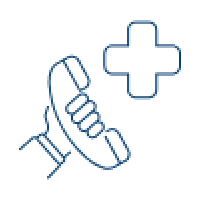Losing weight and exercising are important. Alcohol or sedatives should not be taken. Smoking impairs respiratory control during sleep and causes edema in the upper respiratory tract. Alcohol and sedative drugs reduce muscle tension. Thus, all of them help to create stenosis in the upper respiratory tract. However, some non-sedating antidepressant drugs reduce obstructive sleep apnea by increasing muscle tension during sleep.
CPAP (Continuous positive airway pressure) or BPAP (Non-invasive ventilation) prevents the narrowing of the upper respiratory tract during sleep by giving a certain amount of air pressure through the nose.
Oral prostheses that move the jaw forward and thus the tongue forward can be used.
Types of surgery for snoring have been developed in recent years as more protective and anatomy-friendly interventions.
Surgically, the nose is important first. If there is a mechanical disorder or other problems that prevent the air from passing through the nose easily, such as deviation in the nose, it must be treated. Mild snoring can be completely stopped with only a surgical intervention to the nose.
Treating only the problems in the nose provides a maximum of 25% solution in apnea. However, if there is a problem in the nose, it must be done before or together with the palate operations!!!
Interventions in the Bosphorus region:
- Removal of large tonsils
- Implant application to the palate
- Modified uvulopalatoplasty operations
- Minor tongue operations (uvulapalatal flap or minimal resection)
- Anterior palatoplasty (increasing the tension of the palatal area with sutures by removing the mucosa from the soft palate area)
- Lateral pharyngoplasty (tightening the posterio plica from the palate region)
- Intervention for tongue root (RF or hanging the root of the tongue, taking a piece of the tongue in the midline)
- Operation to shift the tongue to the jawbone
However, it is important to choose the appropriate type of operation according to the type of disease and the region of stenosis. Our results are quite successful. It is important to be able to breathe through the nose, therefore, problems in the nose should be intervened before or at the same time as palate operations. When there is a deviation in the nose, interventions to the uvula and palate region are not successful.
After all, snoring is not just a simple complaint, the important thing is that it is the first sign of apnea that causes serious health problems in the long run, and apnea should definitely be reduced.
Share:








 info@osmanogluhastanesi.com.tr
info@osmanogluhastanesi.com.tr +90 850 800 50 50
+90 850 800 50 50 WhatsApp
WhatsApp




